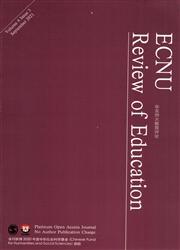精英政治的伪装
IF 2.6
Q1 EDUCATION & EDUCATIONAL RESEARCH
引用次数: 0
摘要
Zachary Howlett的书对中国的精英政治进行了新的描述。与经济学家们对个人技能的优点有着专一的看法不同,豪利特将这一概念解构为其社会基础。这本书的中心科目是高考,这是一种全国性的高考,在这里可以构建、测试和公开展示成绩。豪利特将高考概念化为“命运的成人仪式”(第10-18页),人们认为高考不仅是为了“代表民族共同体的普遍性判断,也是终极超越力量——命运的判断”(第203页)。命运事件是仪式;因此,它们适合民族志研究。Howlett的研究利用2011-2013年间福建三个地点的数据,是了解中国庞大系统的最新尝试。本书共分六章,从多个方面分析了高考的命运。第一章提供了语境化。第二章考察了高考的高风险和后果。第三章重点讨论了高考的不确定性。第四章讨论了考生的个性,而第五章则着眼于考试的时刻。第六章对这一重大事件的宗教和魔法层面提供了一个独特的视角。本文章由计算机程序翻译,如有差异,请以英文原文为准。
Meritocracy’s Disguise
Zachary Howlett’s book provides a new account of meritocracy in China. Unlike economists with their single-minded ideas of merits vis-à-vis individualized skills, Howlett deconstructs the concept to its social foundations. The book’s central subject is Gaokao, the national college entrance examination, where merits are constructed, tested, and publicly displayed. Howlett conceptualizes Gaokao as “fateful rites of passage” (pp. 10–18) that people feel as not only serving “to represent the universalistic judgment of the national community but also that of the ultimate transcendental power—fate” (p. 203). Fateful events are rituals; therefore, they are suited for ethnographic examination. Using such data from three sites in Fujian during 2011–2013, Howlett’s work is the latest attempt to understand the enormous Chinese system. This book comprises six chapters, analyzing various aspects of the fatefulness of Gaokao. Chapter One provides the contextualization. Chapter Two examines the high stakes involved and the consequences of the exam. Chapter Three focuses on the uncertainty of Gaokao. Chapter Four discusses the individual character of the test takers, while Chapter Five zooms in to the moment of the examination. Chapter Six provides a unique perspective on the religious and magical dimension of the fateful event.
求助全文
通过发布文献求助,成功后即可免费获取论文全文。
去求助
来源期刊

ECNU Review of Education
Social Sciences-Education
CiteScore
4.90
自引率
0.00%
发文量
41
审稿时长
10 weeks
 求助内容:
求助内容: 应助结果提醒方式:
应助结果提醒方式:


